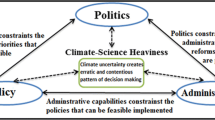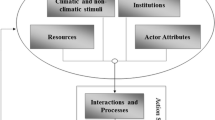Abstract
In addition to reducing greenhouse gas emissions, societies worldwide have to cope with the potential impacts of climate change. The central question of this paper is to what extent our historically grown institutions enable actors to cope with the new challenges of climate adaptation. We present six qualities of governance institutions that are crucial to allow for, and encourage adaptation, and apply them to the National Adaptation Strategies of the Netherlands, the United Kingdom, Finland and Sweden. We conclude that although the governance institutions involved seem to have the basic qualities required, they face five institutional weaknesses, causing tensions on the long term: (1) lack of openness towards learning and variety; (2) strong one-sided reliance on scientific experts; (3) tension between top-down policy development and bottom-up implementation; (4) distrust in the problem-solving capacity of civil society; and (5) wickedness of reserving funding for long-term action.
Similar content being viewed by others
Notes
This paper has been written within the Dutch Climate Changes Spatial Planning Programme, and more specifically within the project ‘Institutions for Adaptation: Are Dutch Institutions Capable of Adapting to Climate Change (IC12)’. Moreover, we gratefully made use of the results of the Partnership for European Environmental Research (PEER) project ‘Europe Adapts to Climate Change: Comparing National Adaptation Strategies’.
References
Adger, W.N., Arnell, N.W. and Tompkins, E.L. (2005) ‘Successful adaptation to climate change across scales’, Global Environmental Change 15 (2): 77–86.
Al-Jeneid, S., Bahnassy, M., Nasr, S. and Raey, M.E. (2008) ‘Vulnerability assessment and adaptation to the impacts of sea level rise on the Kingdom of Bahrain’, Mitigation and Adaptation Strategies for Global Change 13: 87–104.
Andersson, M. and Mol, A.P.J. (2002) ‘The Netherlands in the UNFCCC process – Leadership between ambition and reality’, International Environmental Agreements 2: 49–68.
Argyris, C. and Schön, D.A. (1978) Organizational Learning, Reading, MA: Addison Wesley.
Biermann, F. (2007) ‘Earth system governance as a crosscutting theme of global change research’, Global Environmental Change 17 (3–4): 326–337.
Biesbroek, G.R., Swart, R.J., Carter, T.R., Cowan, C., Henrichs, T., Mela, H., Morcecroft, M.D. and Rey, D. (2010) ‘Europe adapts to climate change: Comparing national adaptation strategies’, Global Environmental Change: Human and policy dimensions 20 (3): 440–450.
Blatter, J. (2003) ‘Beyond hierarchies and networks: Institutional logics and change in transboundary spaces’, Governance: An International Journal of Policy, Administration and Institutions 16 (4): 503–526.
Botchway, F.N. (2001) ‘Good governance: The old, the new, the principle, and the elements’, Florida Journal of International Law 13 (2): 159–210.
Burton, I., Malone, E.L. and Huq, S. (2005) Adaptation Policy Frameworks for Climate Change; Developing Strategies, Policies and Measures, Cambridge: Cambridge University Press.
Carter, T.R. (2007) Assessing the adaptive capacity of the Finnish environment and society under a changing climate: FINADAPT (No. 1/2007), The Finnish Environment Institute (SYKE).
Conant, R.C. and Ashby, W.R. (1970) ‘Every good regulator of a system must be a model of that system’, International Journal of Systems Science 1 (2): 89–97.
DEFRA. (2009) Adapting to climate change – UK climate projections, London: Department for Environment, Food and Rural Affairs; Act on CO2 and Building Britain's Future.
Dewulf, A., Craps, M., Bouwen, R., Taillieu, T. and Pahl-Wostl, C. (2005) ‘Integrated management of natural resources: Dealing with ambiguous issues, multiple actors and diverging frames’, Water Science & Technology 52 (6): 115–124.
Edelenbos, J. (2005) ‘Institutional implications of interactive governance: Insights from Dutch practice’, Governance: An International Journal of Policy, Administration and Institutions 18 (1): 111–134.
EEA. (2008) Impacts of Europe's changing climate – 2008 indicator-based assessment (No. 4/2008), Copenhagen: European Environmental Agency.
Giddens, A. (1984) The Constitution of Society, Berkeley: University of California Press.
Gupta, J., Termeer, C., Klostermann, J., Meijerink, S., van den Brink, M., Jong, P., Nooteboom, S. and Bergsma, E. (2010) ‘The adaptive capacity wheel: A method to assess the inherent characteristics of institutions to enable the adaptive capacity of society’, Environmental Science and Policy 13 (6): 459–471.
Hulme, M. (2009) Why We Disagree about Climate Change; Understanding Controversy, Inaction and Opportunity, Cambridge: Cambridge University Press.
Huxham, C. and Vangen, S. (2005) Managing to Collaborate, London: Routledge.
IPCC. (2007) Climate change 2007: Synthesis report – An assessment of the intergovernmental panel on climate change, Valencia, Spain.
Jordan, A., Huitema, D., van Asselt, H., Rayner, T. and Berkhout, F. (eds.) (2010) Climate Change Policy in the European Union: Confronting the Dilemmas of Mitigation and Adaptation? Cambridge: Cambridge University Press.
Koppenjan, J.F.M. and Klijn, E.H. (2004) Managing Uncertainties in Networks, London/New York: Routledge.
Ministry of Agricultutre and Forestry (MMM). (2009) Evaluation of the implementation of Finland's National Strategy for Adaptation to Climate Change 2009, Helsinki: Ministry of Agriculture and Forestry.
Mickwitz, P., Aix, F., Beck, S., Carss, D., Ferrand, N., Görg, C., Jensen, A., Kivimaa, P., Kuhlicke, C., Kuindersma, W., Manez, M., Melanen, M., Monni, S., Pedersen, A. B., Reinert, H. and Van Bommel, S. (2009) Climate policy integration, coherence and governance, PEER report no 2. Partnership for European Environmental Research, Helsinki.
Orlikowski, W.J. (1996) ‘Improvising organizational transformation overtime: A situated change perspective’, Information Systems Research 7 (1): 63–92.
Pahl-Wostl, C., Craps, M., Dewulf, A., Mostert, E., Tabara, D. and Taillieu, T. (2007) ‘Social learning and water resources management’, Ecology and Society 12 (2): 5.
Pollit, C. and Bouckaert, G. (2000) Public Management Reform: A Comparative Analysis, Oxford: Oxford University Press.
Scharpf, F.W. (1997) Games Real Actors Play; Actor-centered Institutionalism in Policy Research, Boulder, CO: Westview Press.
Scott, J. (1998) Seeing Like a State: How Certain Schemes to Improve the Human Condition Have Failed, New Haven: Yale University Press.
Scott, W.R. (2008) Institutions and Organisations: Ideas and Interests, 3rd edn., Thousand Oaks, USA: Sage Publications, Inc.
Swart, R.J., Biesbroek, G. R., Binnerup, S., Carter, T., Cowan, C., Henrichs, T., Loquen, S., Mela, H., Morecroft, M., Reese, M. and Rey, D. (2009) Europe Adapts to Climate Change: Comparing National Adaptation Strategies, (No. 01/2009), Helsinki: Finnish Environment Institute (SYKE).
Termeer, C.J.A.M. (2009) ‘Water professionals and public leadership’, Irrigation and Drainage 58: S212–S216.
Veraart, J.A. and Bakker, M. (2009) ‘Climate Proofing the Netherlands’, in F. Ludwig, P. Kabat, H. van Schaik and M. van der Valk (eds.) Climate Change Adaptation in the Water Sector, London: Earth Scan, pp. 109–122.
Verweij, M. and Thompson, M. (2006) Clumsy Solutions for a Complex World; Governance, Politics and Plural Perceptions, Basingstoke: Palgrave Macmillan.
Weick, K.E. and Sutcliffe, K.M. (2001) Managing the Unexpected: Assuring High Performance in an Age of Complexity, San Francisco: Jossey-Bass.
Young, O.R. (1991) ‘Political leadership and regime formation: On the development of institutions in international society’, International Organisation 45 (3): 281–308.
Author information
Authors and Affiliations
Rights and permissions
About this article
Cite this article
Termeer, C., Biesbroek, R. & van den Brink, M. Institutions for Adaptation to Climate Change: Comparing National Adaptation Strategies in Europe. Eur Polit Sci 11, 41–53 (2012). https://doi.org/10.1057/eps.2011.7
Published:
Issue Date:
DOI: https://doi.org/10.1057/eps.2011.7




